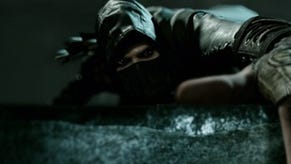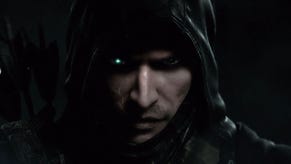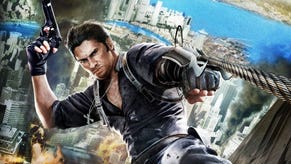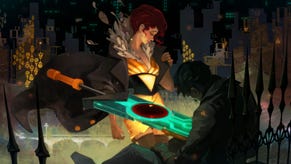Thief PlayStation 4 Review: Not Quite a Master Criminal
Small flaws and annoying design decisions steal Garrett's thunder and prevent this long-awaited stealth revival from living up to its legacy.
This article first appeared on USgamer, a partner publication of VG247. Some content, such as this article, has been migrated to VG247 for posterity after USgamer's closure - but it has not been edited or further vetted by the VG247 team.
Primary Reviewer, Jeremy Parish
In its best moments, Thief draws you in and makes you want to adopt the methods and discipline of its slightly noble, totally criminal protagonist. It makes you want to play like a true thief, a master of non-violent stealth and patient silence.
You don't have to, of course. You can blunder through the game, setting off alerts and killing anyone who gets in your way. You'll die a lot and won't collect much in the way of rewards, but it's certainly possible to take the brute force approach.
Ultimately, you'll find there's more percentage – both in terms of in-game payouts and general satisfaction – in taking the smart, stealthy approach. Certainly I found myself wanting to put an arrow through the heart of particularly annoying patrolmen on many occasions, but I always resisted the urge. Killing the guards and thugs maintaining martial law over the City would have been convenient in the short term, but not only would doing so have diminished my rewards, it would have burned through the finite resources available in the game. Better just to find other ways around them.
Like an actual thief, I spent hours of my time as Garrett casing joints and learning the lay of the land before committing to my heists. I poked around for hidden riches and completed side jobs as often as possible. Thief offers a Trophy (or Achievement) for taking more than 15 hours to complete the game, which I find amusing; by the 15-hour mark, I was little more than halfway through the main story and still had a ton of side jobs to complete. The fact that the developers have included a trophy for being methodical suggests they expect most people to approach Thief as a standard action game. And certainly that is one possible approach, but it strikes me as neither ideal nor particularly entertaining.

Unfortunately, even played the "right" way, Thief often falls short of its developers' lofty intentions. For all the freedom it offers, it ultimately amounts to a fairly standard and one-dimensional take on the stealth genre. The original Thief: The Dark Project helped invent the concept of stealth action back in 1998, alongside Metal Gear Solid, but this new game doesn't feel like it's really kept pace with the genre's growth over the years. Your opponents are still stupid, blind, and easily manipulated. They give up easily once you've broken their line of sight, and they're too dimwitted to follow you into obvious hiding places. You can pluck their possessions right off their bodies provided you don't enter their narrow cone of vision while doing so. If you'd played a stealth game in the past decade, you know the drill.
I feel like Thief's limitations, to some degree, are baked into the genre. Things have to work unrealistically or else the game would be utterly infuriating. Garrett doesn't have radar for tracking the movement of his enemies, and indicators only appear to show the relative location of foes once they're on edge. Yes, this way is more realistic, but until we're all playing games like this via Oculus Rift all those little cheats like radar mini-maps and enemy tracking help make up for the lack of sensory perception that comes hand-in-hand with video games. A stealth game doesn't necessarily need radar or whatever, but without those elements its sensory feedback needs to be impeccable. Unfortunately, Thief feels like a step backward in terms of in-game peripheral awareness.
While you can invest in an optional skill that allows you to temporarily track enemy sounds with visual cues – a mechanic swiped directly from Klei's Mark of the Ninja all the way down to the rippling effect – the actual sound design of the game leaves much to be desired. Stereo positioning feels imprecise, and the volume of enemy sounds is based on distance without apparent regard to what sort of objects lie in between them and Garrett. An enemy five meters away on the other side of a thick brick wall sounds as loud as an enemy five meters down the hall from you. When you're in the thick of a team of patrolmen, the cacophony of footsteps and banter makes it harder to judge your relative safety rather than easier like it should, and it's even worse when you're on alert and it all becomes muddied by the thick electronic music that plays over top.

To make matters worse, the audio suffers from a ludicrous number of bugs and glitches – or at least it did for me on PlayStation 4. Sound effects would suddenly drop out. NPCs would become caught in endless loops of canned banter that would reset midway through, sometimes creating an echo tunnel effect of incidental dialogue. You think it's tedious to watch a guard patrol run through their routine while waiting to make your move? Imagine how much more irritating it becomes when they're constantly repeating the same idiotic patter every few seconds. Meanwhile, patrolmen continue running their routines along the streets during cutscenes, often drowning out dramatic dialogue with yet another musing about how they have a loose tooth or miss sloop stalls.
The repetitive NPC dialogue actually reminds of me some of the tiresomely recycling lines in Skyrim – sloops stalls are destined to become 2014's arrows to the knee, no doubt – which seems fitting given how much Thief reminds me of that game in many other ways. After spending far too many hours as a stealth-driven archer in Skyrim, my Thief experience often felt like a largely scaled-down version of the latest Elder Scrolls... minus shooting to kill, of course. Both games feature bleak grey cityscapes, thieving from idiot AI characters, a ton of glitches (I lost count of how many times I had to reboot Thief because Garrett suddenly lost the ability to pick up new projectiles), and, most of all, monotonous mission design.
In fairness, Thief's central quest manages to be pretty interesting from start to finish. Although I never shook the feeling I'd seen a lot of it before (for instance, the bordello sequence lifted straight from Dishonored), all told it kept things lively. Its few missteps (e.g. several of those ridiculous, clichéd action sequences where everything explodes around the hero except for a single path to safety that appears as if by divine miracle) are balanced by moments of surprising inspiration (such as sneaking through a domain of strange creatures whose senses work differently than humans' and force you to adopt totally different play tactics than usual). Although you can probably guess where the plot will go from the opening cut scene, it's all about the journey, right?

Where Thief fares more poorly is in its side content, which does little to inspire. Granted, I haven't completed every single bonus job in the game, but the overwhelming majority of them amount to little more than slipping into an empty house and stealing something. Sometimes you need to disarm traps, but most of the time the challenge comes not from the theft but simply from figuring out how to navigate the ramshackle walkways of the City to get to your destination in the first place. Few of these jobs offer the challenge of the early mission which sees you sneaking into a home, slipping past a sleeping girl, her watchful father, and their armed guard in order to locate a hidden safe combination. And the handful of novelty missions, like the one where you must covertly guide an annoying drunk back to his hideout, tend to fall flat due to their mediocre writing. Sadly, despite being a game entirely about a master criminal, Thief offers nothing in the way of elaborate heists or multi-part capers. The closest it comes is a handful of interrelated missions for a couple of NPCs.
All that being said, Thief hits the right notes often enough that I wanted to keep playing, and even now I plan to head back and mop up the remaining side jobs just for the satisfaction of having done so. Much of the story unfolds in an epistolary fashion, leaving the player to decrypt many of the plot's nuances and discover interesting side stories alike. Despite the glitches and repetition, I find it easy to get lost in City – in a good way. It helps that Garrett's a more compelling lead than the sociopaths who pass for video game heroes these days: Criminal but not amoral, wry but not a comedian. He's a classic Robin Hood kind of character who steals mostly from the wealthy and opens the story by admonishing his protege not to murder, and it's nice to see. I just wish the rest of the game didn't feel quite so old-fashioned, too.

Second Opinion, Pete Davison
I have very, very mixed feelings about Thief – as, I'm sure, will anyone who played the classic original games. On the one hand, it's a decent enough game particularly noteworthy for the best sense of physical presence in the game world I've experienced in a first-person perspective title for a very long time. On the other… hmm. Something just feels a little "off" about the whole thing.
I settled into the new game quite enjoying the experience. I appreciated the sheer number of options there are to customize your experience – Thief veterans will probably want to turn off things like the Focus mechanic and threat markers, for example – and that the game rewards you for playing the new game in a style that is somewhat closer to its illustrious predecessors. Thief mainstays like water and rope arrows are introduced early on, and sneaking around in the dark is as satisfying as it's ever been – perhaps more so thanks to the "swoop" maneuver that allows you to silently whisk yourself from one shadow to another.
But the more I played, the more I found myself irked by little things about the experience. Why can't Garrett jump? Why can't I fall off platforms except in places where the game specifically says I can fall off them? Why does the whole game unfold in first-person except for shimmying along ledges? Why did they have to put that horrible blue glow on shimmyable ledges and ropes rather than trusting the player to spot them for themselves like in the Good Old Days?

The whole mobility thing is the aspect of the game that starts to grate the most after a while. Garrett is certainly agile… but only some of the time. Stand in front of something the game decides you can climb, and you can hop atop it with no problem. But stand in front of a chest-high box that happens to have a basket of fruit sitting on it, and however much you tap the "climb" button, you're not going anywhere. This is particularly troublesome when trying to get out of the reach of guards, though with the game's somewhat questionable AI it's generally not all that difficult to lose them just by hiding in a darkened corner for a few minutes.
The open-world city exploration is under-realized, and the sidequests are boring, mostly boiling down to "find a glowing window, sneak through it and steal something." I'd much rather more time and attention have been spent on the main missions themselves, most of which are enjoyable enough but a lot more linear than Thief veterans may be accustomed to. Wandering around a hub map does give a nice sense of "place" to the setting as a whole, but it's ultimately at the expense of more varied, flexible missions, and that's a bit of a shame.
I'm also not a fan of the Witcher-style dark fantasy aesthetic that the new game has been wallpapered with. There's nothing inherently wrong with that style in and of itself, but it's been done to death recently, and Thief already had a good thing going in its earlier installments with its medieval-steampunk crossover shtick. I don't need to hear people saying "f**k" and "s**t" in a Thief game; I want to hear them saying "taffer." Granted, there is a Thief fan-baiting incidental conversation between guards that you can overhear in which one complains someone called him a "taffer" and he didn't know what it meant, but aside from that the game starts to feel increasingly Generic Dark Fantasy as it progresses, particularly during the obligatory brothel mission.

The biggest bugbear for established fans of the Thief franchise who have been waiting years for a new installment, however, will be the throwing out of the series' established and extremely well-realized lore in favor of an all-new setting and narrative. It's obvious why this has been done, of course – it's the same reason it's called "Thief" and not "Thief 4" – but those expecting further exploration of the complex tensions between the Hammerites and the Pagans will be left wanting from this experience.
Despite all these criticisms, Thief isn't a bad game, though, and as a reboot designed to introduce complete newcomers to the series, it does its job admirably. If you're an established fan of the Thief series as a whole, though, be aware that this new game is likely to be riddled with disappointment for you.
The Details
- Visuals: They get the job done, but the entire City is rendered in three-tone color scheme (corpse grey, vomit brown, diaper green) really wears on you after a while.
- Sound: One of the game's biggest weaknesses, which is a shame given its importance. Even without the PS4 version's audio glitches, the sound design feels a generation or two behind.
- Interface: Though some commands are occasionally a little too fussy for their own good, the design works – it's minimal without feeling dumbed-down. And the gimmicky use of the PS4 light bar to echo Garrett's light crystal works surprisingly well.
- Lasting Appeal: Despite its repetitive content, Thief offers a huge array of freedom – including minutely customizable difficulty options – that should give it plenty of replay value for its fans.
ConclusionThief will almost certainly frustrate fans of the older trilogy, but it suffers shortcomings on a more objective level as well. Though solidly made, it never challenges the well-worn conventions of stealth action. In short, it lacks a certain spark of inspiration. It's good, yet it falls short of "future classic" status.








